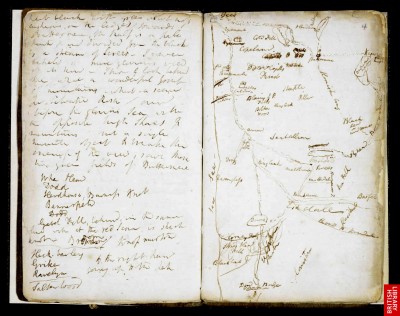If you have ever experienced the brain-garbling which results from knowing that something you had just read was in English but it made no sense to you when you read it, and your first reaction is to toss it aside as old (excuse me … olde) English, and therefor indecipherable, but you know there’s something there so you break out a dictionary and read it again and you still don’t get it, if that happens to you, well then, join the clubbe.

Perhaps when this happens you write off your lack of understanding of whatever it was to having also been <cough> poetry, and, let’s face it, no one is supposed to understand poetry anyways, so you put it down again, … but you have a nagging feeling that there is something more there, something there for you, so you try once more, this time armed with a dictionary to get over the words that have fallen out of favor over time and are blocking your path to understanding, and this time you glean meaning from it. If this has ever happened to you then prepare to be brain-garbled as you read the last lines of the lyrical ballad Rime of the Ancient Mariner by Samuel Taylor Coleridge:
[quote]
To walk together to the kirk,
And all together pray,
While each to his great Father bends,
Old men, and babes, and loving friends
And youths and maidens gay!
Farewell, farewell! but this I tell
To thee, thou Wedding-Guest!
He prayeth well, who loveth well
Both man and bird and beast.
He prayeth best, who loveth best
All things both great and small;
For the dear God who loveth us,
He made and loveth all.
The Mariner, whose eye is bright,
Whose beard with age is hoar,
Is gone: and now the Wedding-Guest
Turned from the bridegroom’s door.
He went like one that hath been stunned,
And is of sense forlorn:
A sadder and a wiser man,
He rose the morrow morn.
[/quote]
After several listenings to the Librivox recording of Mariner, followed by several readings with dictionary accompaniment, and after finally getting the basics, i.e. that a kirk was a church and that these townsfolk were praying before God, two phrases stood out for me in these closing lines. “He prayeth best, who loveth best All things both great and small; For the dear God who loveth us, He made and loveth all.” That was the first, but specifically the line “All things both great and small…” this line had a particular … stinging affect on me, and second, “A sadder and a wiser man, he rose the morrow morn.”, this line left me a bit … sadder too, just like the Wedding Guest, as for wiser, well, we will just have to wait and see.
These two ideas were what stood out for me in the last few lines from the poem, the “author’s message” I suppose, but what was the message to me? Why did this old poem grab my attention? Well let’s look at the second one, about being sadder and wiser, first as it was, to me, the more obvious of the two, and then I think I’ll leave the other to another post.
“A sadder and a wiser man, he rose the morrow morn.” Well this just means that this guy, this wedding guest, won’t go shooting any albatross’ any time soon, right? Not that he was previously excited about some upcoming albatross hunting trip that, having heard the Mariner, he is now going to cancel. Nothing so literal I’m sure, but that he was about to consider shooting an allegorical albatross and now, post Mariner tale, he no longer will. In other words, he was about to throw something away whose value was hidden to him, in other other words he was about to destroy a gift from God.
Warning, from here on out, I am going to get progressively more religious up in here, … that’s just how I role.
The Mariner, being tuned to pick up the vibe from dudes who are about to throw God’s gift’s away, steps in and cautions them. That’s his gift, and his curse. The character Adrian Monk from the TV show Monk often said the same thing about his gift for solving crime, as he would often say that it was a gift and a curse.
Come to think of it Monk and the Mariner have a few other similarities, they are both weird men, somewhat out of place and time, and when they focus on “the guy”, as Monk would call the perpetrator of whatever the heinous act of the week was, neither of them would release “the guy” from their laser focus until they were through with them.
Side Note: The concept of “the guy” is not to be confused with concept of “that guy”, as personified by Bruce Willis in the Die Hard series and explained by Willis’ character in In A Good Day To Die Hard .. and referenced by Kathleen, right here at Saint Carnival, first in
this post and then again in
this one.
Imagine inserting a sliver of Adrian Monk’s face next to one of Willis’s above (this probably works best next to one with hair) and, well, you’ll get a meaningless montage of their faces.
Right, so where was I? Ah yes, I was comparing Monk to the Mariner, not to MacClane! Monk seemed to know who “the guy” was immediately and would doggedly pursue them via the minutiae of evidence they left at the scene of the crime until he could prove what he already knew, (which would require about 40 more minutes of screen time, give or take commercials). Like Monk, the Mariner can see among us just who is “the guy” and focus in on him, but instead of telling their story, as Monk does, the Mariner tells his own. They both have similar curses, to be separated from life and love and oddly out of place and time, but the gifts differ, for Monk’s gift was to forensically discern a persons guilt in a crime, while the Mariner’s is to discern a crime (sin) yet to be committed, and steer “the guy” away.
The Mariner is forever destined to stop and talk with folks who are either too blind, stupid, and depressed, or too happy, satisfied, and self centered, to see clearly the gifts that lie before them. If there is a moment in which we are to live, then these guys are not living in it. If we are to walk with God’s lamp unto our feet, guiding us on our path through life, then these guys are off foraging in the brush with their own flashlight, making their own way. If there is a now in which we are to be, then these guys are in the then or the when.
The Mariner senses that “the guy” who is his current focus is … out of time, out of step, out of sync, and the Mariner steps in to bear witness to what happens when you continue to live that way, he tells them what happens when you shoot your albatross.
Well that doesn’t sound so bad does it? Everyone can use a little course correction from time to time, right? One would think that one would be a better man for it, a happier man, right? It says that the Wedding Guest wakes up a wiser man, and that’s good, right? I mean he is now a man who is no longer about to shoot his own personal albatross, so why then does our storyteller tell us that the wedding guest also wakes up a sadder man? Is it because he has come to realize that his life is not all about him, that his actions affect a larger plan that is not of his design, and that he is off course? Is it the sadness that comes from recognizing for the first time that there is a power greater than ourselves and that we are called to surrender to it? If so, then that will prove to be a short lived sadness because that sadness is only as deep as our continued identification with our self is strong. In other words, if we are sad because we have to surrender to God, and if we see it as us surrendering then we still see ourselves as being the one doing the action, the surrendering, but I would argue that in this case to surrender is not a verb, it is not an action we take. Oh sure, it may involve dropping to ones knees and sobbing to the heavens, and indeed that is an action, but on the other side of this outward manifestation of surrendering is an anti-action, for it is only in total stillness of mind, body, and spirit, that we truly surrender. Violently weeping and rending of clothes only get’s us, well, bleary eyed and in need of a tailor. This may seem like a, beside the point, point, or a delving too deeply into the proverbial weeds point, after all, it just says the guy wakes up sad, right? But indulge me just a bit further as I believe there is a second stage of sadness that I would like to address.
So, he may be sad because it can be sad to let oneself go. I remember that I felt sad when I first discovered God. By the way, yes, it is true, I discovered God. I was on an archaeological dig in the middle east and unearthed a shiny … no, better yet, I was a lead researcher in the discovery of the elusive Higgs Boson “God particle” …

… well I think you get the joke, to say one discovered God is rather like a child closing their eyes to make an
it, go away. (Sorry kid, the
it is everywhere.) The self centered-ness of humanity can be an awesome
reality bending power, but it is nothing compared to God’s. Whether you
discover God for yourself, or not, the
Enneagram of existence will continue to turn, and ample opportunities to find Him will be presented to you, and each time this opportunity arises you will either
get it, or you won’t, until one day you will … or you will die. And, so, what happens if you do happen to find God? On that day will the heavens open and rain down infinite joy upon you? No, I mean at least that’s not how it was for me. My experience was more like
Joe Pantoliano in the
Matrix. Even though he is awakened to reality and knows the Matrix is not real, he longs for the creature comforts of the Matrix, and makes a
Faustian deal to … go back to sleep. Similarly, once having found God, and having come to believe that I had been living in a self centered dream state my whole life, all I wanted to do was get closer to Him, as he was the higher power to which I belonged, he was my
Father who art in Heaven and I want more than anything to be his son. But for each step closer I take to God there is a reluctance on my part, a pulling away. For each step closer means I have to release something
precious to me, a closely held belief here, a love there, a passion here, a desire there and on and on. As I awake more and more to what reality really is, and see that all of humanity suffers the same delusion as me, and that most are still slave to it, and that many will die still enslaved … well, that can get pretty depressing. Are we are therefore called, in an odd way, as God reveals himself to us over time, and we see the world
steeped in darkness around us, is our calling first and foremost to not be depressed? Well that’s a depressing calling. I mean, where was the fanfare as my fellow followers of Christ welcomed me to the party? Where was my invitation to join the Club of Eternal Joy? I had made it, so where was my fatted calf? Nope, that wasn’t to be my experience, mine was more like waking up in the Matrix with reality looking all seedy, bent, and alone. Once I saw all that, and continue to see it, I sometimes want to return to that blissful state of ignorance, I want to forget what my soul has learned and wrap myself up in some of those creature comforts, like Joe Pantoliano’s character in the Matrix, I know the juicy red steak isn’t real, but I want to eat of it anyways.
That is the second sadness I spoke of earlier, the sadness I wanted you to hang on a bit longer to see. The sadness of the one who is awakened from their sleep only to witness that the rest of the world is still sleeping. I think that this is the sadness that is referred to in the last line of Rime of the Ancient Mariner.
[quote]
A sadder and a wiser man,
He rose the morrow morn.
[/quote]
Until next time, thanks for reading.






Permalink
Very nice, and I look forward to more of your process for interpreting the poem.